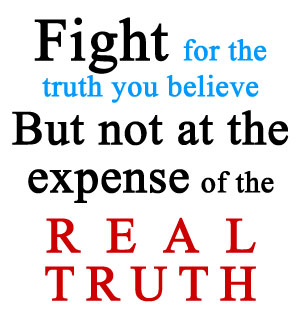Hebrews 6:1-3
New Bible studies and devotionals sent to your email. The first one includes a free gift!
Before you read: This article is part of a larger series that builds on itself from the foundation up, with each study building on the last. If something in this article does not make sense to you or if you believe it to be incorrect please be sure you have read over the entire course before passing your final judgment. Also be sure to visit this page’s FAQ And Objections Page
This isn’t just any book. It is a collection of 66 books written over a large space of time. Each verse is connected to another. Every doctrine found in it has an effect on another doctrine. That is why it is so important for us to know how to understand the Bible.
Galatians 5:9
9 A little leaven leaveneth the whole lump.
Many people will tell you that for the sake of unity and peace we must accept differences in doctrine being taught in the church. But it must be made clear that light has no fellowship with darkness. We are NEVER told to forsake truth or to allow a lie to stand for the sake of these things.
Instead, we are told to contend for the faith:
Jude 1:3-4
3 Beloved, when I gave all diligence to write unto you of the common salvation, it was needful for me to write unto you, and exhort you that ye should earnestly contend for the faith which was once delivered unto the saints. 4 For there are certain men crept in unawares, who were before of old ordained to this condemnation, ungodly men, turning the grace of our God into lasciviousness, and denying the only Lord God, and our Lord Jesus Christ.
Now obviously we ALL seem to have different beliefs about things. We may not all see things in the Bible the same way. But that does not mean we should accept this. It only means we have to be taught and teach the truth more accurately.
We should do this with love, patience, and respect. Because none of us are born with a complete understanding of the Bible. In fact, after years of being a Christian, I can honestly say that I will never have a complete understanding of it here on earth.
I will, no doubt, have some wrong beliefs. But, I never want the brethren to simply ignore it for the sake of “keeping peace” between us. I want them to at least go on record as being in disagreement. That way we can either work it out together and come to the same conclusions or at least disagree with patients while either I or they continue to grow in our understanding. It may be that with time we will come together on the matter down the road. Don’t disown your brother just because he has some learning to do.
Just because you do not have a full understanding of something doesn’t mean it isn’t true. You have to search it out before jumping to that conclusion.

For example, if I held a coin in front of you that you had never seen before and said there was an image of a president on it, but I showed you the back side which has the image of a bird, you would immediately say “That doesn’t make sense.” From there you have a choice.
You can say that I told a lie, or you can examine the coin from every angle. You would see that it does have a president on it and not just a bird, but you have to look at it from another angle.
This is why we must read and study the Bible in depth. Things may not always be as they seem, or as we believe them to be.
Here is an example:
James 2:24
24 Ye see then how that by works a man is justified, and not by faith only.
Galatians 2:16
16 Knowing that a man is not justified by the works of the law, but by the faith of Jesus Christ, even we have believed in Jesus Christ, that we might be justified by the faith of Christ, and not by the works of the law: for by the works of the law shall no flesh be justified.
Looking at only at James 2:24 we would think it is our works that make us justified. So if someone told us that it wasn’t our works that justified us we would think they were a liar.
Looking only at Galatians 2:16 we may believe that it is only our belief in Jesus that makes us justified. So if someone told us it was our works that justify us we would think they were a liar.

So what is the truth? Here we see how one of us can look at one side of a coin, while the other looks at the back side, and we argue about what the coin says. But how do the two sides connect? We can’t just pick a side while ignoring the other side.
Every coin has an edge that connects the 2 sides.
The verses that connect these 2 are:
James 2:21-22
21 Was not Abraham our father justified by works, when he had offered Isaac his son upon the altar? 22 Seest thou how faith wrought with his works, and by works was faith made perfect?
So we now can see that we are justified by faith and works together, and without one or the other, we are not justified.
For those of you who are having trouble with that statement let me explain it this way: First comes belief, then comes action, the two complete each other to form faith. You can say that you have faith all you want, but without works then you have no proof. Faith will produce works naturally. So, no works mean you must not have faith either.
So make sure you FULLY examine the scriptures before calling someone a liar for teaching something that they believe is in the Bible. Because it may be true and you don’t even know it.
But if you examine it and it doesn’t prove to be true then you have the duty of teaching the person. Connect the dots for them. Show them the scriptures that both refute their teaching AND that explain the truth. DO NOT IGNORE THE SCRIPTURES THEY USE! EXPLAIN HOW THEY FIT IN. Do so in the spirit of love, knowing that they just haven’t been taught yet. Show them the side of the coin and bridge the gap.
In this way, you can bring your brother out of the dark and into the light, where you can have peace and unity. Who knows, he may show you the light instead.
Romans 14:5
5 One man esteemeth one day above another: another esteemeth every day alike. Let every man be fully persuaded in his own mind.

What you believe, you believe fully. It doesn’t matter if it is true or not. Believe it or not, this is good. We should all hold what we believe to be true. We should also be willing to defend that truth. BUT not at the expense of truth itself.
Many people will fight hard for something way past when they should let it go. For example, if you believe the Bible never said the words “The Son of God” and I show it to you, … you would have a choice to let go of the “truth” you once held in favor of the REAL TRUTH. Or, you could ignore the REAL TRUTH to hold onto your lie.
Holding onto the truth is good. Just don’t hold onto something you thought was true after it is proven not to be.
But, what if it seems to be true? What if someone tells you something that seems true, yet it contradicts something the Bible has said?
Deuteronomy 13:1-5
If there arise among you a prophet, or a dreamer of dreams, and giveth thee a sign or a wonder, 2 And the sign or the wonder come to pass, whereof he spake unto thee, saying, Let us go after other gods, which thou hast not known, and let us serve them; 3 Thou shalt not hearken unto the words of that prophet, or that dreamer of dreams: for the Lord your God proveth you, to know whether ye love the Lord your God with all your heart and with all your soul. 4 Ye shall walk after the Lord your God, and fear him, and keep his commandments, and obey his voice, and ye shall serve him, and cleave unto him. 5 And that prophet, or that dreamer of dreams, shall be put to death; because he hath spoken to turn you away from the Lord your God, which brought you out of the land of Egypt, and redeemed you out of the house of bondage, to thrust thee out of the way which the Lord thy God commanded thee to walk in. So shalt thou put the evil away from the midst of thee.
What if one day someone came up to you and said, I am an angel of god. And, they told you that god commanded you to worship some other god than the one of the Bible? What if they even moved the stars in the sky? What if they told you something that goes against what has already been said in the Bible?
God doesn’t change according to the Bible.
Malachi 3:6
6 For I am the Lord, I change not; therefore ye sons of Jacob are not consumed.
James 1:17
17 Every good gift and every perfect gift is from above, and cometh down from the Father of lights, with whom is no variableness, neither shadow of turning.
Numbers 23:19
19 God is not a man, that he should lie; neither the son of man, that he should repent: hath he said, and shall he not do it? or hath he spoken, and shall he not make it good?

Many people claim that the Bible shows a change in God between the Old and New Testament. But the Bible never does make that claim. In fact, it says God is always the same, and what He said thousands of years ago still holds true.
So what if someone claims God has changed? What if they say God no longer requires us to obey Him? What if they say what was written in the Bible thousands of years ago is no longer valid?
According to the verses I have just shared, the Bible says that such a person or statement is a liar.
2 Corinthians 11:3-4
3 But I fear, lest by any means, as the serpent beguiled Eve through his subtilty, so your minds should be corrupted from the simplicity that is in Christ. 4 For if he that cometh preacheth another Jesus, whom we have not preached, or if ye receive another spirit, which ye have not received, or another gospel, which ye have not accepted, ye might well bear with him.
I have heard a lot of things being taught and preached. I have seen a lot of things that are called god or said to be god in action. But, the Bible says God will not break or alter what He has said.
So while it is a good idea to listen to someone in case you are wrong, it is also a good idea to test their words. Does their doctrine hold up? Does yours? If you have to change God, or ignore a scripture, then something is wrong.
When you read the Bible you can not read it as though each verse stands alone. They all connect.
I would like to give you 6 final bits of advice for understanding the Bible.
1.) If you read something that contradicts another verse.
Look for the connecting verses that can explain how the two seemingly contradicting verses actually connect. For example, one verse may say thou shalt not kill and another verse may say thou shalt kill. Look for verses that may indicate when the right time to follow thou shalt not or thou shalt would be. You may find that there are verses that show you the proper context of each of these seemingly contradictory ones. Thus they no longer contradict, they just have different uses and times to be used.
2.) How to know if you should take something as literal or figurative.
A lot of the Bible is literal. A lot is also figurative. How do you know which one to take as a metaphor and which one as literal? The answer is to let the Bible tell you. Look for words that indicate the Bible is using a metaphor such as the word “like.” Look for verses that would indicate if this is a vision, a dream, or has some other symbolic meaning. If you find those verses then it is not literal. Otherwise, it is.
3.) Don’t make assumptions.
We get into trouble when we apply our own ideas to what the Bible is saying. Let the Bible explain itself. Most problems come from adding to or taking away from verses, without even knowing it! It’s easy to insert meaning into something that isn’t there. Don’t put words into Gods mouth.
4.) What if something in science contradicts the Bible?
Establish this in your mind right now.
Romans 3:4
4 God forbid: yea, let God be true, but every man a liar; as it is written, That thou mightest be justified in thy sayings, and mightest overcome when thou art judged.
Let your critical eye be on the science rather than on the Bible. Understand that man is not always 100% right, but God is. You will soon enough discover that upon close inspection, much of what is taught by men is full of holes. Your first thought should never be “Maybe the Bible is wrong.” It should always be “The world must be wrong.”
5.) What if someone teaches something wrong?
First, how do you know they are wrong? Have you looked at their teaching from all angles? Do that first while testing each part of their doctrine with scripture. Does their doctrine connect the dots and have all sides of the coin? Or is there a hole in it?
If the doctrine contradicts any verse in the Bible you should point it out. If the verse was overlooked by them, or not accepted, then it is time to show the holes in the teaching and then show the truth.
6.) LET THE BIBLE INTERPRET ITSELF!!!
I can not say this enough! We need to get our understanding of the Bible from the Bible itself. We should NEVER use our experiences as a guide to understanding it. It is the word of God and so it has deeper wisdom than man. Your job isn’t to interpret it. Your job is to understand it as it explains itself.
Unit 1 Complete. Return To Course Home To Begin Unit 2 – Sin and Eternal Judgement OR
Return To Christianity 101 Unit 1 To Review What You Have Gone Over
July 12, 2015 at 6:27 pm | | 3 comments
Thank you
Excellent post. Personally I have made the Bible final authority in my life, whatever I understand to do, I do. Like you said opinion must never override what the Bible actually says. The Bible cannot be disproved – it is the Word of God. As for apparent contradictions, the Bible never contradicts itself – but there may be things we don’t understand yet. Too much of church teaching is based on man-made tradition and trying to explain why things happen, rather than on what the Bible actually says.
Thanks Matthew. I like how you said “whatever I understand to do, I do”. I heard a sermon a long time ago about a man who asked his dad what he should do about something in his life. The dad said to “just do what you know to do, and I will support you”. When I began ministry work my greatest fear was to do something wrong because I may not understand something properly. I never wanted to teach something wrong. But it’s a great thing to know that God wants us to do what we know to do, and He will teach us the rest as we go. Will we do some kind of damage? Honestly…we most likely will. But how much more damage would be done if we remained too afraid to be wrong that we didn’t even do what we understood to be right?